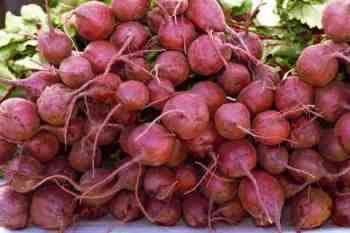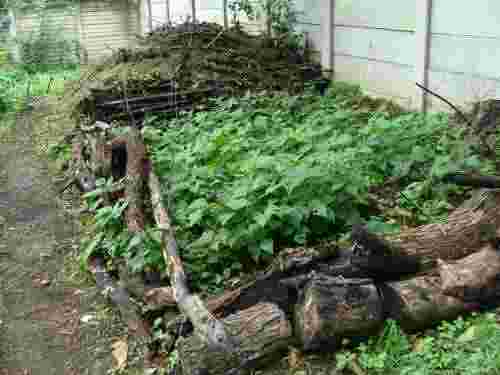- Home
- Right choices
- Pickled Beets
Pickled beets
Pickled beets are rich in iron and soluble fibre.
For a change, beetroot that is not too vinegary and is delicious, though they are also excellent just boiled. Pickled or plain, best get them young. That way they have a naturally sweet flavour.
Cooking beetroot is simple, though it does take some time.
Enter the pressure cooker[3]. A must surely for every family; certainly if you're planning to improve the health of your colon with foods like chickpeas, dried beans and of course beetroot. I use it for meat that looks a little on the tough side too.

This page was last updated by Dr Barrie Lewis on 20th July, 2021.
Cooking beetroot
Time is money, and so are energy costs. The use of pressure reduces the boiling time by at least two-thirds. We use ours every week; for extracting the cartilage from chicken bones and making soups too, and cooking beetroot; and to prepare the chickpeas for your own homemade hummus, for example.
For pickled beets and also our authentic hummus recipe; chickpeas are best pressure cooked from scratch. In cans they are more than four-times the price.
Another reason to enjoy beets and the tops is their choline and betaine; these are very important compounds in the methylation of highly toxic homocysteine, a breakdown product of protein metabolism.
The average American diet contains only half of the required daily amount; the result is inflammation in the organs of the body. Read more by typing "choline food sources" into the Site Search tab in the main menu above.
My dad had a farm, and we grew beets. Believe you me, we ate them in every conceivable form. They must have the same active ingredient as MoviPrep; make sure you read right to the end of this page, otherwise your are missing out on something seriously good[6].
Pickled beets
Ingredients
Ingredients for your pickled beets.
- 5 medium size beets
- 1/4 cup cider vinegar
- I don't add any sugar as they are rich in natural
sugar: Sugar beets are a first cousin. Maybe one or two teaspoons if you
have a sweet tooth, and aren't overweight!)
- 1 Tbsp olive oil
- 1/2 teaspoon dry mustard
- Salt to taste
Actually, we pressure cook 10 beets, and enjoy five before pickling.
Go for it
- Remove the tops from the beetroot, and cook the leaves separately. They make a delicious spinach. Pressure-cook the beets for about 15 minutes depending on size, or just boil until tender. More than an hour. Cooking beetroot couldn't be simpler.
- Drain the beets, rinsing them in cold water. Use your fingers to slip the peels off of the beets, and discard. Slice the beets.
- Make a vinaigrette by whisking the vinegar, olive oil, salt and dry mustard. Combine beets and vinaigrette in a bowl and allow to marinade for a half hour and, hey presto, you have your pickled beets. Now use them to make a beetroot salad.
- If you want them to last longer, then boil them for five minutes in the vinegar and olive oil mixture.
Growing beets is a cinch but you must water them.
They love a medium to light soil. What it definitely does not like is a soil which has recently been manured; this will cause the roots to be mis-shapen. But well-rotted compost is a must for a good crop.
Either use a garden site which was well-prepared for a previous crop, particularly legumes which add nitrogen to the soil, or dig the sod over in the autumn and let the winter frost break up even more.
Or grow a crop of green beans once you've removed the compost. Those nitrogen fixation bacteria will make a great starter for your next heap or a patch destined for pickled beets.
- Starting a compost pile[4]
- Nitrogen fixation bacteria[5]

When digging over the earth, remove as many stones as possible; the roots like to grow without restriction or the beets will be misshapen.
Please note, beets don't like to dry out. They just go to seed before forming a proper bulb, becoming tough and fibrous. Keep them moist, and eat them young.
Sow the seed when the danger of hard frost has passed. Plant one row at a time up until mid-July or you will end up with too many at once. (In the Northern hemisphere. In the South we have to get them in by January - February).
Then sow another row in a few weeks.
Before sowing, soak a couple teaspoons of seed in water for an hour or two. They germinate without difficulty. With a trowel, scoop out a line in the earth about 2.5cm deep, spacing them about 30cm apart. Beets like all vegetables need full sunshine.
In the rows plant them about 5cm apart and cover with soil; water well.
The seedlings will appear in one to two weeks, depending on the weather. Remove any weak looking seedlings, leaving only the strongest.
The tender young seedlings often attract the attention of
insects and birds. Cut the bottoms and tops off plastic bottles and place over the seedlings if necessary.
A good soaking once a week is a must if there is no rain. This encourages more rapid growth and your beets will be more tender, tasty and sweeter. Down on your hands and knees, say a prayer, and get any weeds out. Fortunately they form a dense foliage that keeps most unwelcome plants down.
Seriously, weeding is an important part of
gardening. It is routine stuff, and sets the mind free to roam; when
the world wearies, and society ceases to satisfy, there's always some picking over to be done.
Don't let them grow woody. Young beets are best, max 2" in diameter, and do not toss the leaves. They make a marvellous spinach.
In fact, my sister-in-law grows beets for the leaves, and gives us the beets!
Quick constipation relief
Like the apple diet pickled beets are rich in soluble fibre, the best sort for a healthy gut. They make the stool soft and easy to pass and give quick constipation relief. Don't be surprised by the colour; it is not blood!
Pickled beets and apples are God's gifts to the constipated colon.
The benefits of beetroot are vast; rich in iron too.
Red blood in the stool, by the way usually means haemorrhoids, but can be serious. More worrying is black blood; sign of a bleeding ulcer, usually from taking anti inflammatory drugs. Tens of thousands die every year from it; sudden death from bleeding internally.
The normal passage of your food through the bowel is less than 36 hours. If it's more than that before you get a pink show in the stool, then you should be eating a lot more fibre in your diet. Constipation is associated with a heap of serious bowel diseases. HELENS 15 EURO SALAD (then known as the five dollar salad) is what saved me from the misery of constipation when I was studying Chiropractic in Chicagoland.
- Quick constipation relief
- Authentic hummus recipe - make it in five minutes[1].
Healthy living tips
I always direct my slipped disc patients to this pickled beets page; these healthy living tips are just one way to try to improve folk's overall health. I learned a long time ago, when a patient died from a heart attack soon after I'd fixed his back that it me who had missed the plot. I never said a word about his weight; that's serious negligence and cost him his life.
IMPORTANT CONSIDERATIONS
- Go from our delicious BEETS recipe back to Why BEETROOT CONSTIPATION ..?
- Apple salad recipe; delicious with your pickled beets. They both are excellent sources of soluble fibre.
- Interesting facts about strawberries, more soluble fibre and loaded with antioxidants.
- Recipe for Tabouli Tabouleh, a dead easy Lebanese dish of tomato, onion, mint and parsley.
Interesting link @ Pickled Beets
- HYALINE CARTILAGE ... the second most important page at CHIROPRACTIC HELP.
- Home
- Right choices
- Pickled Beets
- Authentic hummus recipe. Web: https://tinyurl.com/4yfm4b92
- Functional properties of beetroot (Beta vulgaris) in management of cardio-metabolic diseases
- Pressure cooking. Web: https://tinyurl.com/ta2h7drx
- Starting a compost pile. Web: https://tinyurl.com/mu4acu4x
- Nitrogen fixation bacteria. Web: https://tinyurl.com/4s4cjrx4
- MoviPrep Sebastian Vettel Exhaust. Web: https://tinyurl.com/yckthb5b
When browsing these links use right click and "Open Link in New Tab", or you may get a bad gateway signal.
Did you find this page useful? Then perhaps forward it to a suffering friend. Better still, Tweet or Face Book it.
